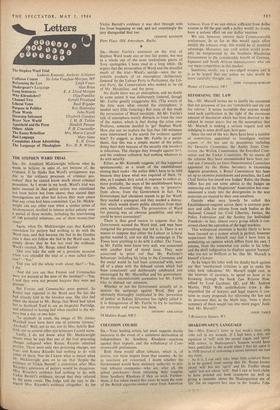SIR,—Henry Fairlie's comment on the trial of Stephen Ward made
one or two fair points, but was as a whole one of the most tendentious pieces of Tory apologetics I have read in a long while. He argues that the prosecution of Ward and the dreadful result of the trial—Ward's suicide—were the in- evitable products of an atmosphere 'deliberately fostered' by the Labour Party in Parliament, the Lib- eral Party, the Conservatives who wished to be rid of Mr. Macmillan, and the press.
No doubt there was an atmosphere, and no doubt to some extent it was deliberately fostered, though Mr. Fairlie greatly exaggerates this. (The events of the time were what created the atmosphere; it needed very little fostering.) But none of this made the persecution of Ward inevitable. All Mr. Fairlie's talk of atmosphere merely distracts us from the root of the matter, which is that during the crisis over Profumo, someone decided to 'get' Stephen Ward. How else can we explain the fact that 140 witnesses were interviewed in the search for evidence against him? To suggest, as does Mr. Fairlie in a paren- thesis, that this was a simple matter of the police doing their duty because of the security risk involvod is ridiculous. The charges they brought against 'hi'. and the evidence collected, had nothing whatever to do with security.
Either, as Mr. Kennedy suggests, all this happened spontaneously, as a result of the establishment closing their ranks—the police didn't have to be told because they knew what was required of them. Or else, as I suspect, they acted in response to orders or, more probably, the ways of the establishment being the subtle, discreet things they are, to 'pressures' from above, from the Government in fact. The Government had abundant reason to go for Ward; they needed a scapegoat and they needed a distrac- tion which would divert public attention from their own wretched condition. The prosecution of Ward for poncing was an obvious possibility, and what could be more convenient?
There is thus good reason to suppose that the Government wanted the Ward trial, and may have instigated the proceedings that led to it. There is no reason to suppose that either the Labour or Liberal parties wanted it, and nor did the campaign in The Times have anything to do with it either. The Times, as Mr. Fairlie must know very well, was concerned with another kind of moral issue. They were concerned to point out that Mr. Profumo's behaviour, including his lying to the Commons, and the social world he had been connected' with, were all of a piece with the debased values which had been consciously and deliberately celebrated and encouraged by Mr. Macmillan and his government. From this uncomfortable accusation too Mr. Fairlie tries to distract our attention.
Whether or not the Government actually set in motion the campaign against Ward, they are obviously thoroughly implicated in this 'perversion of justice' as Sydney Silverman has rightly called it. It is disingenuous of Mr. Fairlie to try to incrimin- ate everyone and anyone but them.














































 Previous page
Previous page